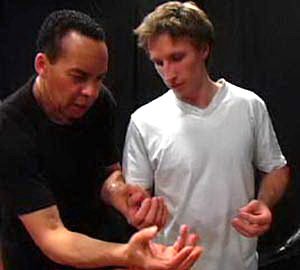 In examining the major theme in F W Boreham’s writings—‘Realizing full expression’—it is interesting to see that the theological dimensions were not explicitly drawn until his editorials took on a greater religious content in the 1940s. When an editorial on this subject was reworked into an essay for a Christian readership Boreham said:
In examining the major theme in F W Boreham’s writings—‘Realizing full expression’—it is interesting to see that the theological dimensions were not explicitly drawn until his editorials took on a greater religious content in the 1940s. When an editorial on this subject was reworked into an essay for a Christian readership Boreham said:"The supreme thing that we each have to do in the theatre of life is to give that individuality its full and natural expression .… For that very purpose it was divinely created ... each man’s individuality is itself a message to mankind, a message which he, and he alone, can faithfully deliver. And the whole art of life lies in giving such genuine and accurate and rational expression to that unique individuality of mine, that ... men may receive a message from my Father that could have come to them in no other way."[1]
In contrast to the Puritan doctrine of human depravity, Boreham was optimistic about the potential of human beings. Perhaps it reflected the influence of the Quaker writers upon him about whom “this intrinsic worth of the individual sprang for them out of the divine possibilities inherent in the soul of man” and their belief in “the divine right of every soul”.[2] Boreham viewed the uniqueness and novelty of an individual as an act of a creative God. The human challenge of ‘making the best of oneself’, Boreham believed, was the rightful response to one’s creator and a divine statement to other human beings. While in his editorials Boreham avoided biblical terms like ‘salvation’, the act of ‘discovering oneself’ and ‘making the best of oneself’ represented the language by which his theology of salvation was expressed.
In his editorials to a mixed faith readership, Boreham wrote of realizing one’s full expression as “the highest attainment in life” and as a way to “attain to happiness” in life.[3] Individuals would also be motivated by the knowledge of each doing things in their own way, developing a perfection of form and the satisfaction of doing things which bore “the stamp of one’s individuality”.[4] While the uniqueness and value of the individual were central to Christian theology, Boreham in his editorials did not adopt explicit religious language or claim biblical authority in asserting these truths until the 1940s. The realization of one’s full potential through ongoing learning, becoming oneself and expressing one’s own opinions were offered by Boreham as life wisdom attested through the personalities of significant historical figures rather than as biblical imperatives.
Geoff Pound
Image: In ‘the theatre of life’.
[1] Boreham, When the swans fly high, 131-134.
[2] Rufus M Jones, The faith and practice of the Quakers (London: Methuen, 1927), 89.
[3] Boreham, Mercury, 1 January 1921.
[4] Boreham, Mercury, 8 April 1922.


